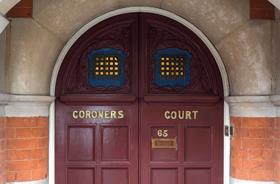The chief coroner has called for another overhaul of a service that has become a postcode lottery following deep cuts to local authority funding.
In a report published today, His Honour Judge Thomas Teague KC says dilapidated buildings, persistent delays, and too few personnel and courtrooms are among ‘underlying systemic problems’ that continue to plague the coroner service 10 years after the last bout of modernisation.
The report* comes after the judge visited every coroner area in England and Wales during 2022 and early 2023. He alludes to ‘welcome progress’ over the last decade through a combination of area mergers, national guidance, and training and oversight by chief coroners. But his tour ‘exposed the need for structural change to simplify and streamline the governance and management of individual coroner areas’.
The judge stresses that he cannot make recommendations on policy matters, including funding. But his report makes clear that council cuts have helped create a patchwork of provision. Local authorities retain responsibility for appointing coroners and funding the service.
In ‘all but of a handful of areas’, teams of coroners’ officers are ’understaffed and overworked’. This adds to delays that remain a ‘significant challenge’ to the service. Each coroner’s officer should hold about 25 case files, but no area met this expectation. The judge encountered examples of caseload per officer exceeding 100.

‘Although the resourcing needs of coroner areas vary because of differences in size, geography and work profiles, the dramatic contrast between areas, particularly in relation to court and office accommodation, does not correlate with their differing needs,’ he says. ‘In some areas, the irreducible minimum requirements of a coroner area of any sort are not being met.’
The ‘precarious financial position’ of some local authorities can affect listing decisions, he notes. In one area, the council asked the coroner to delay cases across financial years.
Dilapidated buildings plagued by black mould, leaking ceilings and no disabled access are cited among the service’s physical shortcomings; together with a lack of dedicated courtrooms and inadequate security.
Though funding is beyond his remit, measures that councils could implement now include appointing more salaried coroners to reduce reliance on fee-paid assistants, and improving ‘cumbersome’ and ‘unfair’ recruitment practices, the judge adds. The service also needs to move away from an ‘outdated’ system of governance which requires councils to agree with the police how it should function.
*Extraordinary report of the Chief Coroner – the coroner service 10 years post-reform. HM Courts and Tribunals Judiciary
This article is now closed for comment.



























3 Readers' comments